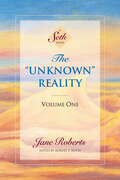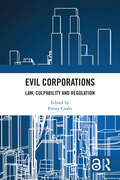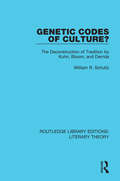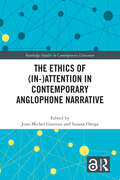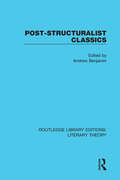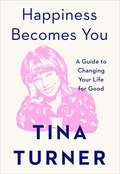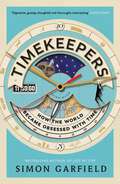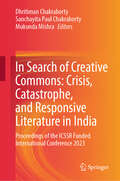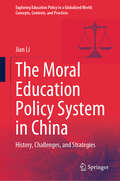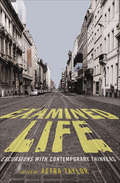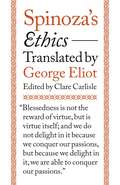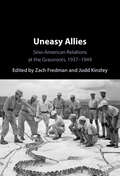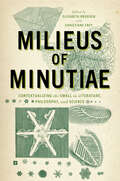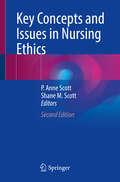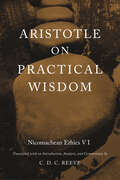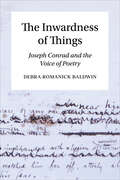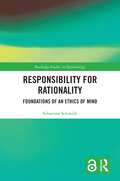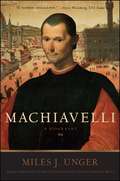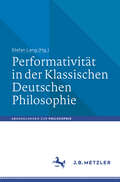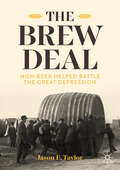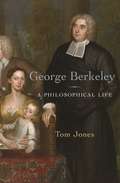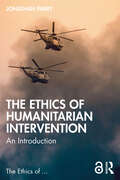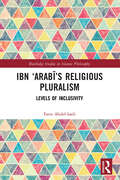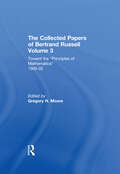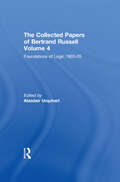- Table View
- List View
The Unknown Reality, Vol 1 (A Seth Book)
by Jane RobertsFrom the Bestselling Author of Seth SpeaksIn this mind-stretching journey into the very frontiers of consciousness, Seth reveals the multidimensional nature of the human soul. In Seth Speaks, Seth introduced the concept of &“probable realities,&” in which our idle daydreams and unfulfilled impulses do take place, in which all possible choices are fully experienced by other portions of the self. Now in this first volume of The &“Unknown&” Reality, Seth explains the dazzling labyrinths of unseen probabilities involved in any decision, and how our awareness of these can enrich the waking life we know. In a fascinating exploration of the cosmic web of our existence, Seth reveals:• The purpose of dreams, and how they are often fulfilled unconsciously• Misconceptions about death and the afterlife• How different probable realities intersect and influence one another• The relationship between physical health and inner reality• A series of exercises to help you discover the unknown portions of your greater identity&“The self is multidimensional when it is physically alive. It is a triumph of spiritual and psychological identity, ever choosing from a myriad of probable realities its own clear unassailable focus. When you don&’t realize this, then you project upon life after death all of the old misconceptions. . . . The fact is that in life you poise delicately and yet perfectly between realities, and after death you do the same.&” — Jane Roberts, Speaking for Seth
Evil Corporations: Law, Culpability and Regulation
by Penny CroftsThis book elaborates and interrogates the idea of evil corporations from a diverse range of disciplines.There has long been awareness of systemic harms inflicted by corporations, but this awareness has rarely led to any effective legal means to prevent and/or respond adequately to them. Lawyers and legal theorists appear to be stuck asking the same questions, and giving the same ineffective answers. Part of the problem, this book maintains, is the relative lack of theoretical interrogation into the nature of corporations as responsible, moral agents. To break this stasis, this book draws upon philosophies of wickedness in order to ask whether or not corporations are, or can be, evil. With contributions from a range of different disciplines, including law, cultural theory, theology, and philosophy, it offers a novel account of how and why corporate wrongs are caused, whilst exploring the extent to which the legal system itself facilitates such wrongdoing.The book targets a broad international audience with research interests in corporate crime. This will be of particular interest to those within the legal discipline, including corporate law, criminal law, corporate crime and law and humanities scholars.Chapter 9 of this book is freely available as a downloadable Open Access PDF at http://www.taylorfrancis.com under a Creative Commons Attribution-Non Commercial-NoDerivatives (CC-BY-NC-ND) 4.0 license.
Genetic Codes of Culture?: The Deconstruction of Tradition by Kuhn, Bloom, and Derrida (Routledge Library Editions: Literary Theory)
by William R. SchultzIn this text, first published in 1994, the author examines the interdisciplinary significance of the theory of science, literature and philosophy according to the figures who achieved prominence in those fields - Kuhn, Bloom and Derrida. Each scholar's theory is discussed in terms of its major concepts, and the book then relates their fields within the context of deconstruction's interdisciplinary movement. This title will be of interest to students of literature and philosophy.
The Ethics of (Routledge Studies in Contemporary Literature)
by Susana Onega Jean-Michel GanteauThis volume argues that contemporary narratives evince a great deal of resilience by promoting an ecology of attention based on poetic options that develop an ethics of the particularist type. The contributors draw on critical and theoretical literature hailing from various fields: including psychology and sociology, but more prominently phenomenology, political philosophy, analytical philosophy (essentially Ordinary Language Philosophy), alongside the Ethics of Care and Vulnerability. This volume is designed as an innovative contribution to the nascent field of the study of attention in literary criticism, an area that is full of potential. Its scope is wide, as it embraces a great deal of the Anglophone world, with Britain, Ireland, the USA, but also Australia and even Malta. Its chapters focus on well-established authors, like Kazuo Ishiguro (whose work is revisited here in a completely new light) or more confidential ones like Melissa Harrison or Sarah Moss.Chapter 2 of this book is freely available as a downloadable Open Access PDF at http://www.taylorfrancis.com under a Creative Commons [Attribution-Non Commercial-No Derivatives (CC-BY-NC-ND)] 4.0 license.
Post-Structuralist Classics (Routledge Library Editions: Literary Theory)
by Andrew BenjaminModern literary theory is increasingly looking to philosophy for its inspiration. After a wave of structural analysis, the growing influence of deconstruction and hermeneutic readings continues to bear witness to this. This exciting and important collection, first published in 1988, reveals the diversity of approaches that mark the post-structuralist endeavour, and provides a challenge to the conventional practice of classical studies and ancient philosophy. This book will be of interest to students of ancient philosophy, classical studies and literary theory.
Happiness Becomes You: A Guide to Changing Your Life for Good
by Tina TurnerTina Turner—legendary singer and actress, icon to millions, and author of the &“brave and wry&” (Vulture) memoir My Love Story—shares her deeply personal book of wisdom that explores her longstanding faith in Buddhism and provides a guide to these timeless principles so you can find happiness in your own life. I dedicate this book to you… in honor of your unseen efforts to triumph over each problem life sends your way. Tina was a global icon of inspiration. And here, with Happiness Becomes You: A Guide to Changing Your Life for Good, Tina shows how anyone can overcome life&’s obstacles—even transform the &“impossible&” to possible—and fulfill our dreams. She shows how we, too, can improve our lives, empowering us with spiritual tools and sage advice to enrich our unique paths. Buddhism has been a central part of Tina Turner&’s life for decades and, in music, film, and live performances, she has shined as an example of generating hope from nothing, breaking through all limitations, and succeeding in life. Drawing from the lessons of her own life, from adversity to stratospheric heights, Tina effortlessly shows how the spiritual lessons of Buddhism help her transform from sorrow, adversity, and poverty into joy, stability, and prosperity. Here, Tina shares the wisdom of an extraordinary lifetime in Happiness Becomes You making this the perfect gift of inspiration for you or a loved one.
Timekeepers: How the World Became Obsessed with Time
by Simon GarfieldBy the bestselling author of Just My Type: a &“thoroughly enjoyable and illuminating&” journey into the concept of time &“stuffed with fascinating material&” (Observer, UK).Timekeepers is a book about our obsession with time and our desire to measure it, control it, sell it, film it, perform it, immortalize it and make it meaningful. In this fascinating, anecdotal exploration, award-winning author Simon Garfield has two simple intentions: to tell some illuminating stories, and to ask whether we have all gone completely nuts. Here, Garfield explores the nature of time through stories such as: the Beatles learning to be brilliant in an hour and a half; an Englishman arriving back from Calcutta, refusing to adjust his watch; Beethoven&’s symphonic wishes being ignored; a US Senator&’s speech that goes for 25 hours; the horrors of war frozen at the click of a camera; a woman who designs a ten-hour clock and reinvents the calendar; Roger Bannister living out the same four minutes over a lifetime; and a who prince attempts to stop time in its tracks.&“Digressive, gossipy, thoughtful and thoroughly entertaining.&”—The Sunday Times, UK
In Search of Creative Commons: Proceedings of the ICSSR Funded International Conference 2023
by Mukunda Mishra Dhritiman Chakraborty Sanchayita Paul ChakrabortyThis book contains selected papers presented at the international conference titled 'In Search of Creative Commons: Crisis, Catastrophe, and Responsive Literature in India', held at the Abid Ali Khan Centre for Digital Archive and Translation of Cultures, Gour Mahavidyalaya (College) from 31 August to 2 September, 2023 in collaboration with the Department of English, Dr. Meghnad Saha College. The conference was funded by the Indian Council of Social Science Research (ICSSR). In this book, three basic questions are considered. First, as humans try to live in-and-through catastrophes and exceptional situations in the contemporary world, what new perspective can literature as a creative form offer for healing and restorative purposes? Second, what new idioms and narrative styles, massive crises such as famine, partition, migration, the decimation of forests, rivers, and the disappearance of villages held up in creative articulations in colonial and postcolonial times in India? Can these representations be called “responsive literature”? Further, and this is the third major contention of this book, how can responsive literature be thought of as a conceptual category? What new transdisciplinary optic should be adopted to go beyond the limits of the “literary” and eventually include the “non-literary”? The objective of these discussions was to contribute to the larger discursive literature on disaster studies, which we believe has been excessively hegemonized by concepts from the West. By bringing in indigenous ideas from Bhasa Sahitya (language and literature), the images of samaj (society), samata (equity), and ahimsa (non-violence), the existing literature on catastrophe and crisis studies can finally be decolonized.
The Moral Education Policy System in China: History, Challenges, and Strategies (Exploring Education Policy in a Globalized World: Concepts, Contexts, and Practices)
by Jian LiThis book examines the moral education policy system in China, discussing the challenges of promoting moral education policy in the country, and proposes relative strategies. It explores the moral education policy in China from various perspectives, including in preschool education, primary education, higher education, vocational type-based higher education, secondary vocational education, English education, music education, classroom teaching, citizenship education, and Chinese language education. This book serves as a guide for scholars and researchers who are interested, and work in, research on moral education policy in China, administrators, stakeholders in China's education system, and graduate students who major or minor in the field of moral education policy in China.
Examined Life: Excursions with Contemporary Thinkers
by Astra TaylorPhilosophy reconnects with daily life in these conversations with eight renowned thinkers—the uncut interviews from the documentary film Examined Life. Astra Taylor&’s documentary film Examined Life took philosophy out of the academy and into the streets, reminding us that great ideas are born through profound engagement with the hustle and bustle of everyday life, not in isolation from it. This companion volume features the complete and uncut interviews with eight influential philosophers, all conducted while on the move through public spaces that resonate with their ideas. Slavoj Žižek ponders the purpose of ecology inside a London garbage dump. Peter Singer&’s thoughts on the ethics of consumption are amplified against the backdrop of Fifth Avenue&’s posh boutiques. Michael Hardt ponders the nature of revolution while surrounded by symbols of wealth and leisure. Judith Butler and a friend stroll through San Francisco&’s Mission District, questioning our culture&’s fixation on individualism. And while driving through Manhattan, Cornel West—perhaps America&’s best-known public intellectual—compares philosophy to jazz and blues, reminding us how intense and invigorating the life of the mind can be. Offering exclusive moments with great thinkers in fields ranging from moral philosophy to cultural theory to gender studies, Examined Life reveals philosophy&’s power to transform the way we see the world around us and to imagine our place within it.
Spinoza's Ethics
by Benedictus de SpinozaAn authoritative edition of George Eliot's elegant translation of Spinoza's greatest philosophical workIn 1856, Marian Evans completed her translation of Benedict de Spinoza's Ethics while living in Berlin with the philosopher and critic George Henry Lewes. This would have become the first edition of Spinoza's controversial masterpiece in English, but the translation remained unpublished because of a disagreement between Lewes and the publisher. Later that year, Evans turned to fiction writing, and by 1859 she had published her first novel under the pseudonym George Eliot. This splendid edition makes Eliot's translation of the Ethics available to today's readers while also tracing Eliot's deep engagement with Spinoza both before and after she wrote the novels that established her as one of English literature's greatest writers.Clare Carlisle's introduction places the Ethics in its seventeenth-century context and explains its key philosophical claims. She discusses George Eliot's intellectual formation, her interest in Spinoza, the circumstances of her translation of the Ethics, and the influence of Spinoza's ideas on her literary work. Carlisle shows how Eliot drew on Spinoza's radical insights on religion, ethics, and human emotions, and brings to light surprising affinities between Spinoza's austere philosophy and the rich fictional worlds of Eliot's novels.This authoritative edition demonstrates why George Eliot's translation remains one of the most compelling and philosophically astute renderings of Spinoza's Latin text. It includes notes that indicate Eliot's amendments to her manuscript and that discuss her translation decisions alongside more recent English editions.
Uneasy Allies: Sino-American Relations at the Grassroots, 1937–1949
by Judd C. Kinzley Zach FredmanThis timely collection of essays examines Sino-American relations during the Second World War, the Chinese Civil War and the opening of the Cold War. Drawing on new sources uncovered in China, Taiwan, the UK and the US, the authors demonstrate how 'grassroots' engagements - not just elite diplomacy - established the trans-Pacific networks that both shaped the postwar order in Asia, and continue to influence Sino-US relations today. In these crucial years, servicemen, scientists, students, businesspeople, activists, bureaucrats and many others travelled between the US and China. In every chapter, this innovative volume's approach uncovers their stories using both Chinese and English language sources. By examining interactions among various Chinese and American actors in the dynamic wartime environment, Uneasy Allies reveals a new perspective on the foundations of American power, the brittle nature of the Sino-American relationship, and the early formation of the institutions that shaped the Cold War Pacific.
Milieus of Minutiae: Contextualizing the Small in Literature, Philosophy, and Science
by Cynthia Wall Hans-Jörg Rheinberger Christopher Johnson Roger Maioli Margareta Ingrid Christian Andreas Mahler Marianne Schuller Mareike Schildmann Elena Fabietti Carmen Schmechel Dan Liu Malte RauchThe long history of tiny matter(s) in the sciences, thought, and culture From catastrophic weather and steady warming caused by the accumulation of carbon particles in the Earth&’s atmosphere to societies brought to a standstill by microscopic viruses, the new millennium has reminded us of how the minutest of phenomena can have outsized effects. This notion is one that has preoccupied the European and Anglo-American cultural imaginary since at least early modernity.Milieus of Minutiae brings together an interdisciplinary group of scholars to investigate various forms and appearances of minutiae prior to and beyond the advent of magnification. The collection illuminates connections between the empirical practices and technologies with which minutiae have come to be associated and the broader, more diffuse discourses—from the philosophical to the artistic—that have attended theories of smallness before and after Hooke&’s Micrographia. Placing essays on Renaissance poetry, Romantic fiction, and matters of punctuation alongside essays on early modern germ theory and the optics of microscopic technology, this rigorously framed volume extends from sixteenth-century pathology to twentieth-century architectural theory, natural science to literature and art.
Key Concepts and Issues in Nursing Ethics
by P. Anne Scott Shane M. ScottThis second edition offers updates, new topics, and new short case studies, based on real stories from the health care arena, ensuring that each chapter of this book is rooted in descriptions of nursing practise that are grounded, salient narratives of nursing care. The reader is assisted to explore the ethical dimension of nursing practice: what it is and how it can be portrayed, discussed, and analysed within a variety of practice and theoretical contexts. One of the unique contributions of this book is to consider nursing not only in the context of the individual nurse – patient relationship but also as a social good that is of necessity limited, due to the ultimate limits on the nursing and health care resource. This book will help the reader consider what good nursing looks like, both within the context of limitations on resources, during crises situations, and under conditions of scarcity. Indeed, any discussion of ethical issues in nursing should be well grounded in aconceptualisation of nursing that nursing students and practising nursing can recognise, accept and engage with. Nursing, like medicine, social work and teaching has a clear moral aim – to do good. In the case of nursing to do good for the patient. However it is vital that in the pressurised, constrained, post-COVID-19 pandemic health service of the 21st century, we help nurses explore what this might mean for nursing practice and what can reasonably be expected of the individual nurse, and the nursing profession, in terms of good nursing care.
Aristotle on Practical Wisdom: <i>Nicomachean Ethics</i> VI
by C. D. ReeveNicomachean Ethics VI is considered one of classical philosophy’s greatest achievements. Aristotle on Practical Wisdom is the first full-scale commentary on this work to be issued in over a century, and is the most comprehensive and philosophically illuminating to date. A meticulous translation coupled with facing-page analysis enables readers to engage directly with the account of phronêsis or practical wisdom that Aristotle is developing, while a full introduction locates that account in the context of his ethical thought and of later ethical thought more generally. The commentary discusses the text line by line, illuminating obscure passages, explaining technical ones, and providing a new overall interpretation of the work and the nature of practical reason.A companion volume, Action, Contemplation, and Happiness, expands on this interpretation to provide a startling new picture of Aristotle’s thought as a whole. Although the two books can be approached separately, together they constitute one of the most daring and original contemporary readings of Aristotle’s philosophy. Aimed at committed students of these notoriously difficult writings, C. D. C. Reeve’s engaging and lucid books should find a wide audience among philosophers, classicists, and all readers willing to wrestle with a thinker of unparalleled subtlety, depth, and scope.
The Inwardness of Things: Joseph Conrad and the Voice of Poetry
by Debra Romanick BaldwinThe Inwardness of Things considers Joseph Conrad as a modern voice in an ancient and enduring quarrel between the poets and the philosophers. Beginning from the polemical poetics of his 1897 preface, Debra Romanick Baldwin focuses on Conrad’s distinctively poetic “inward” approach to truth – an inwardness that is found in lived experience, in language, and in the world beyond the individual. The book traces Conrad’s poetic voice from the rhetoric of his private letters to the narrative techniques of his fiction and finally to his explicit engagement with abstract approaches to truth. Baldwin applies narrative and rhetorical analysis to Conrad’s private correspondence, showing how he encouraged fellow writers – John Galsworthy, F. Warrington Dawson, R.B. Cunninghame Graham, Ted Sanderson, and Edward Noble – to engage with the inwardness of their own experience. The book explores how Conrad crafted moments of narrative solidarity in his fictional narratives to evoke the experience of the inwardness of another, while also considering his explicit polemics against abstract approaches to truth-seeking. Mindful of the colonial, late Victorian, Polish Romantic, and cosmopolitan contexts in which Conrad wrote, The Inwardness of Things nevertheless situates him in a broader human conversation that he himself invited and argues for the enduring value of his art.
Responsibility for Rationality: Foundations of an Ethics of Mind (Routledge Studies in Epistemology)
by Sebastian SchmidtThis book develops the foundations of an ethics of mind by investigating the responsibility that is presupposed by the requirements of rationality that govern our attitudes. It thereby connects the most recent research on responsibility and rationality in a unifying dialectic.How can we be responsible for our attitudes if we cannot normally choose what we believe, desire, feel, and intend? This problem has received much attention during the last decades, both in epistemology and ethics. Yet, its connections to discussions about reasons and rationality have been largely overlooked. The book has five main goals. First, it reinterprets the problem of responsibility for attitudes as a problem about the normativity of rationality. Second, it connects substantive and structural rationality by drawing on debates about responsibility. Third, it supports recent accounts of the normativity of rationality by explicitly defending the view that epistemic reasons and other ‘right‑kind’ reasons are genuine normative reasons, and it does so by drawing on recent discussions about epistemic blame. Fourth, it breaks the stalemate between rationalist and voluntarist accounts of mental responsibility by proposing a hybrid view. Finally, it argues that being irrational can warrant moral blame, thus revealing an unnoticed normative force of rational requirements.Responsibility for Rationality is an original and essential resource for scholars and advanced students interested in connecting strands of normative theory within epistemology, metaethics, and moral psychology.The Open Access version of this book was published with the support of the Swiss National Science Foundation.
Machiavelli: A Biography
by Miles J. UngerHe is the most infamous and influential political writer of all time. His name has become synonymous with cynical scheming and the selfish pursuit of power. Niccolò Machiavelli, Florentine diplomat and civil servant, is the father of political science. His most notorious work, The Prince, is a primer on how to acquire and retain power without regard to scruple or conscience. His other masterpiece, The Discourses, offers a profound analysis of the workings of the civil state and a hardheaded assessment of human nature. Machiavelli’s philosophy was shaped by the tumultuous age in which he lived, an age of towering geniuses and brutal tyrants. He was on intimate terms with Leonardo and Michelangelo. His first political mission was to spy on the fire-and-brimstone preacher Savonarola. As a diplomat, he matched wits with the corrupt and carnal Pope Alexander VI and his son, the notorious Cesare Borgia, whose violent career served as a model for The Prince. His insights were gleaned by closely studying men like Julius II, the “Warrior Pope,” and his successor, the vacillating Clement VII, as well as two kings of France and the Holy Roman Emperor. Analyzing their successes and failures, Machiavelli developed his revolutionary approach to power politics. Machiavelli was, above all, a student of human nature. In The Prince he wrote a practical guide to the aspiring politician that is based on the world as it is, not as it should be. He has been called cold and calculating, cynical and immoral. In reality, argues biographer Miles Unger, he was a deeply humane writer whose controversial theories were a response to the violence and corruption he saw around him. He was a psychologist with acute insight into human nature centuries before Freud. A brilliant and witty writer, he was not only a political theorist but also a poet and the author of La Mandragola, the finest comedy of the Italian Renaissance. He has been called the first modern man, unafraid to contemplate a world without God. Rising from modest beginnings on the strength of his own talents, he was able to see through the pious hypocrisy of the age in which he lived. Miles Unger has relied on original Italian sources as well as his own deep knowledge of Florence in writing this fascinating and authoritative account of a genius whose work remains as relevant today as when he wrote it.
Performativität in der Klassischen Deutschen Philosophie (Abhandlungen zur Philosophie)
by Stefan LangPerformativität spielt avant la lettre in der Klassischen Deutschen Philosophie eine bedeutende Rolle. Sie ist u.a. ein zentraler Bestandteil originärer Interpretationen des Absoluten, des Subjekts oder auch des Wissens. Seit den 2010er Jahren mehren sich daher Untersuchungen, die dem Performativen bei Kant, Fichte, Schelling, Hegel und in der Frühromantik nachspüren. Dieser Sammelband greift diese Entwicklung auf. Anhand interdisziplinärer Beiträge wird Performativität innerhalb der Klassischen Deutschen Philosophie erläutert und diskutiert. Dabei wird der hermeneutische und systematische Ertrag performativer Interpretationen dargestellt.
The Brew Deal: How Beer Helped Battle the Great Depression
by Jason E. TaylorDuring the final stages of Prohibition, the US government allowed the consumption and sale of “non-intoxicating” beer, which was at or below 3.2% alcohol-by-weight. Beer’s return—permitted with an eye toward job creation during the Great Depression—was one of President Franklin D. Roosevelt’s earliest New Deal policies. In this book, economic historian Jason E. Taylor takes readers through the rapid resurgence of American breweries and shows how beer helped spark a sharp recovery in the spring of 1933. Taylor begins with stories of how the nation’s 1,400 breweries were decimated by the onset of Prohibition in 1920. He then turns to the frothy debates that led Congress to declare 3.2 beer “non-intoxicating,” and hence allowable under Prohibition. While April 7th is now celebrated as “National Beer Day,” the original April 7th—when legal beer returned after more than 13 years away—brought raucous scenes that make today’s Mardi Gras festivities seem tame by comparison. The Brew Deal shares stories of breweries, people, politics, perseverance, and the various roles that 3.2 beer has played in the evolving American beer scene.
George Berkeley: A Philosophical Life
by Tom JonesA comprehensive intellectual biography of the Enlightenment philosopherIn George Berkeley: A Philosophical Life, Tom Jones provides a comprehensive account of the life and work of the preeminent Irish philosopher of the Enlightenment. From his early brilliance as a student and fellow at Trinity College Dublin to his later years as Bishop of Cloyne, Berkeley brought his searching and powerful intellect to bear on the full range of eighteenth-century thought and experience.Jones brings vividly to life the complexities and contradictions of Berkeley’s life and ideas. He advanced a radical immaterialism, holding that the only reality was minds, their thoughts, and their perceptions, without any physical substance underlying them. But he put forward this counterintuitive philosophy in support of the existence and ultimate sovereignty of God. Berkeley was an energetic social reformer, deeply interested in educational and economic improvement, including for the indigenous peoples of North America, yet he believed strongly in obedience to hierarchy and defended slavery. And although he spent much of his life in Ireland, he followed his time at Trinity with years of travel that took him to London, Italy, and New England, where he spent two years trying to establish a university for Bermuda, before returning to Ireland to take up an Anglican bishopric in a predominantly Catholic country.Jones draws on the full range of Berkeley’s writings, from philosophical treatises to personal letters and journals, to probe the deep connections between his life and work. The result is a richly detailed and rounded portrait of a major Enlightenment thinker and the world in which he lived.
The Ethics of Humanitarian Intervention: An Introduction (The Ethics of ...)
by Jonathan ParryFew topics generate as much controversy and debate as armed humanitarian intervention. Military force involves death and destruction, as well as interfering in other countries’ domestic affairs. But, crucially, non-intervention is also controversial. When confronted with humanitarian crises abroad, many feel that outsiders are not only justified in using force to halt the abuses, but that they must do so. The Ethics of Humanitarian Intervention: An Introduction offers a guide to these ethical debates.In clear and informative style Jonathan Parry explores the following topics: The morality of defending others, including the ‘responsibility to protect’ (R2P). State sovereignty and self-determination as barriers to intervention. The possibility of consensual intervention. Just causes for intervention: what kinds of human rights abuses warrant intervention? The effectiveness of intervention: does it work in practice? Alternatives to intervention, including aiding rebels, economic sanctions, and providing aid. Whether there is a duty to intervene. Examples of intervention – including the former Yugoslavia, Iraq, Liberia, and Libya – are used to illustrate the ethical dilemmas in question. The arguments of important theorists of intervention, such as John Stuart Mill, Michael Walzer and Jeff McMahan, are also explained clearly and critically. Each chapter concludes with questions for discussion and reflection. The Ethics of Humanitarian Intervention: An Introduction is ideal reading for students and researchers in philosophy, applied ethics, politics and international relations.Chapter 3 of this book is freely available as a downloadable Open Access PDF at http://www.taylorfrancis.com under a Creative Commons Attribution (CC-BY) 4.0 license.
Ibn ‘Arabī’s Religious Pluralism: Levels of Inclusivity (Routledge Studies in Islamic Philosophy)
by Faris Abdel-hadiThis book marks a significant contribution to the debate around Ibn ʿArabī’s religious pluralism, focusing on his multifaceted approach to non-Abrahamic religions.For nearly eight hundred years, the writings and ideas of the great Spanish Sufi master Ibn ʿArabī have shaped Islamic intellectual and spiritual culture, from North and West Africa and France on the one hand, to Iran, the Levant, Central Asia, and the Far East on the other. Modern scholarship on the “Greatest Master” is consequently at an all-time high. This book weighs in on a well-known aspect of his religious worldview, namely his perspective on religious pluralism, but does so from an entirely different angle. Offering a very close reading of his major works, newly translated by the author, and paying particular attention to a highly developed celestial metaphor prompted by his encounter with a group of pagan sun-worshippers, the book offers new insights into the nature and scope of Ibn ʿArabī’s understanding of Islamic inclusivism. Ultimately, the book contributes to our understanding of both interfaith dialogue and the history of world religions through the prism of Ibn ʿArabī’s work.The book will be of particular interest to students and scholars working in a range of fields, including Islamic philosophy, Sufism, and intellectual history.
The Collected Papers of Bertrand Russell, Volume 3: Toward the 'Principles of Mathematics' 1900-02 (The Collected Papers of Bertrand Russell)
by Gregory H. MooreThis volume shows Russell in transition from a neo-Kantian and neo-Hegelian philosopher to an analytic philosopher of the first rank. During this period his research centred on writing The Principles of Mathematics where he drew together previously unpublished drafts. These shed light on Russell's paradox. This material will alter previous accounts of how he discovered his paradox and the related paradox of the largest cardinal. The volume also includes a previously unpublished draft of an early attempt to solve his paradox, as well as the earliest known version of his generalised relation arithmetic. It contains three articles which have never previously been published in English.
The Collected Papers of Bertrand Russell, Volume 4: Foundations of Logic, 1903-05 (The Collected Papers of Bertrand Russell)
by Bertrand RussellThis volume covers the period from the beginning of Whitehead and Russell's work on Volume 2 of the Principles of Mathematics to the critical discovery of the theory of descriptions in 1905. The volume contains a large number of unpublished manuscripts which give a vivd picture of Russell wrestling with the logical paradoxes, often unsuccessfully, as he tries out one foundational scheme after another. Previously unpublished work in the theory of denoting is included, which predates the famous article of 1905. This volume also gathers together several manuscripts on the so-called 'zig-zag' theory with which Russell attempted to provide a type-free foundation for mathematics. A number of reviews and survey articles, together with two talks on modality and truth, are also published for the first time.
